Lunch with Sumiko
Gan Kim Yong balances continuity and change in the Cabinet
Good team dynamics are about playing to each person’s strengths, says Deputy Prime Minister Gan Kim Yong. He tells executive editor Sumiko Tan that this applies as much to politics as to the private sector.
Mr Gan Kim Yong has a reputation in the civil service for being a good minister to work for.
When I ask four civil servants for their view of him, they don’t hesitate to give their feedback:
“A calm and fatherly figure to many, well respected.”
“He’s a really genuine and kind person... he listens to officers at any level, takes in feedback but also gives very good advice or guidance.”
“He doesn’t sweat the small stuff and is totally calm and incisive in the face of crisis. He makes us feel we are in it together and we can overcome the problem. I like him.”
“An understanding boss who’s not afraid to take charge even for difficult decisions. He’s relatable, has a great sense of humour and is generally super well-liked... His policy sense is very strong and he always thinks for the common Singaporean.”
By the end of lunch, I begin to see why Mr Gan is so well-liked.
His warmth feels genuine and he often shifts the spotlight to others and gives them their due. “Teamwork” is a favourite word, and his easy smile is matched by a twinkle in his eye.
I’m meeting the Deputy Prime Minister (DPM) and Minister for Trade and Industry at his office in The Treasury in High Street. Our lunch, at 1.30pm because of his tight schedule, is a casual affair.
Mr Gan had suggested through his press secretary that we have takeaway ramen. She asks me to choose the eatery, and I suggest Keisuke Plus at the Funan mall next to The Treasury.
We have our meal in a dining room used to host guests. Sunlight streams in from large windows. Outside, the Supreme Court with its flying-saucer roof looms, and you can see Marina Bay Sands in the distance.
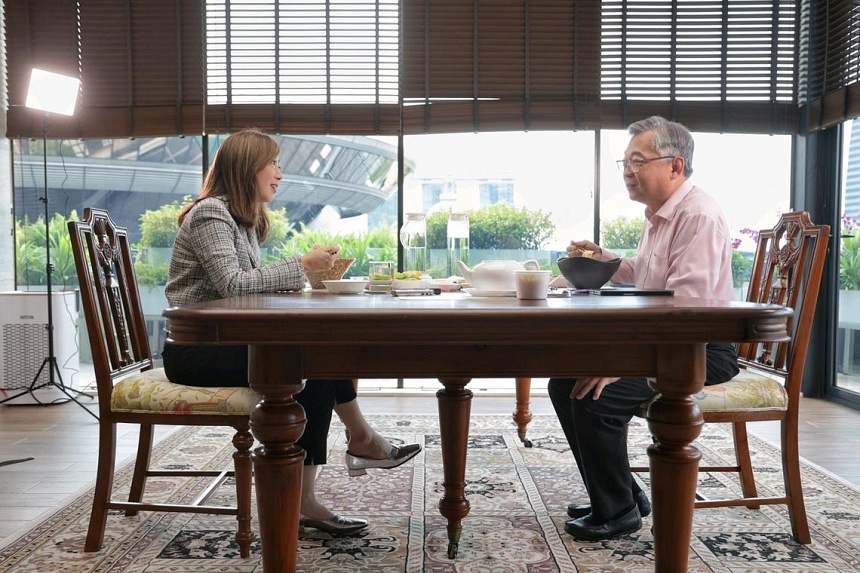
Mr Gan has ordered an ultra-rich tonkotsu ramen and I have a Hiroshima oyster broth version. We each get a Caesar salad and I also ask for a pork gyoza to share.
Each ramen comes with two hard-boiled eggs in their shells, which prove challenging to peel. We spend the first minute of lunch in silence, engrossed in the task. I make a mess of my eggs, with half the white stubbornly stuck to the shells. Mr Gan, I observe, fares no better.
His reputation for being calm and steady was most likely a factor in Prime Minister Lawrence Wong’s decision to appoint him as DPM in his new Cabinet in May 2024. Mr Gan also retained his Trade and Industry portfolio.
The DPM appointment, however, raised some eyebrows.
PM Wong, 51, heralded the fourth-generation (4G) leadership of the People’s Action Party (PAP), and some had expected him to pick 4G peers as deputies. His other DPM is Mr Heng Swee Keat, who entered politics in 2011 and is regarded as part of the 4G.
Mr Gan, who is 65, belongs to the previous generation. He became a Member of Parliament way back in 2001, joining the Government four years later as a Minister of State before moving to the Cabinet.
For years, he was a steady, if low-profile, minister – until the Covid-19 pandemic in 2020.
As Health Minister, he co-chaired the Covid-19 multi-ministry task force with Mr Wong, who was then Minister for National Development. Their rapport was clear during press conferences, which made Mr Gan’s DPM appointment not unexpected, reasoned others.
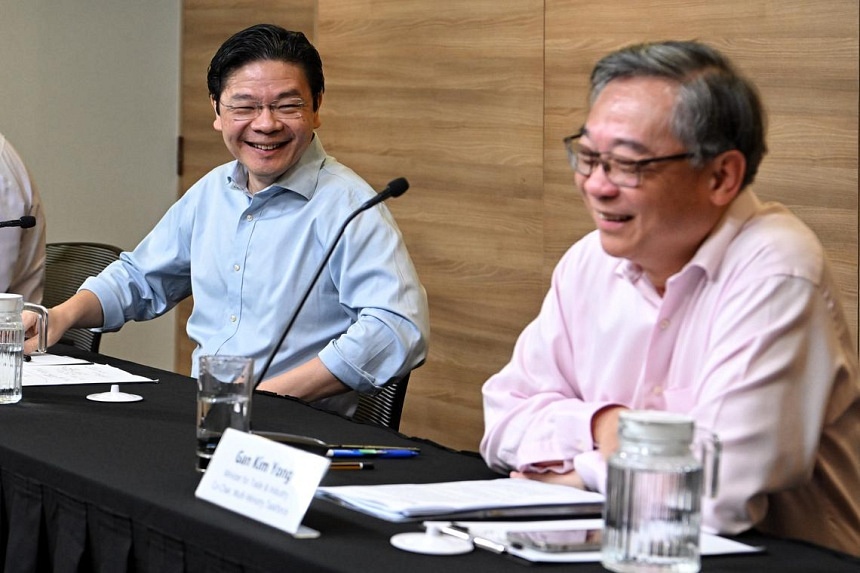
Mr Gan, however, says he was taken aback when PM Wong asked him to be DPM. “I told him that I’m 3G and really, going forward, you should have 4G leadership quite clearly established.”
PM Wong explained that he wanted to balance change and continuity. A senior, more experienced minister would guide and support the younger 4G ministers and provide alternative views.
“Of course, I asked him, ‘For how long do you want me to be DPM?’” Mr Gan recalls with a laugh.
“He said timing (wise), we’ll really have to see how soon the younger ministers will be ready and will be up on their own, and probably I will have to be a DPM at least until after the election,” he says.
It might even be for longer.
Depending on who is elected and the strengths and weaknesses of the new Cabinet and how ready they are, “if necessary, I may need to stay on for a couple more years after that”, Mr Gan says.
“We’ll see how it develops and make a decision at that point in time.”
NatSteel days
Politics wasn’t part of Mr Gan’s career game plan – he wanted to teach electrical engineering at a university – but he has grown to accept that life can lead you to unexpected places.
He was born in Singapore in 1959 and has six older siblings. His father was the principal of a Chinese school in Malaya before settling in Singapore, where he had a trading business dealing in foodstuff. The family lived in a Hongkong Street shophouse near the Singapore River.
He was a handful at Catholic High Primary School and was often sent to detention for talking too much and disrupting the class. “A teacher told me, ‘Why don’t you just stay back every day, since you get detained so often’.”
But he had a more serious side even at that young age.
Fascinated by radios, he built a transmitter while in primary school, under the guidance of a cousin who was studying electrical engineering at a polytechnic.
In secondary school at Catholic High, he opted for the technical stream because his heart was set on doing engineering.
At National Junior College, he was determined to be accepted by Britain’s Cambridge University, which he knew had a good engineering programme. He worked hard and won a government overseas merit scholarship which funded his studies there.
A vivid memory was seeing snow for the first time. “There were a few Singaporean students and we all rushed out to stand in the snow after the lecture.”
Upon graduation and completion of national service, he applied to the senior tutors scheme at the National University of Singapore. He wanted to teach and to get a PhD in engineering.
But the Government had other ideas on how he should serve out his bond. He was sent to the Ministry of Trade and Industry, where he worked in areas such as trade and science and technology.
Towards the last year of his eight-year bond, he was posted to the Internal Security Department in the Ministry of Home Affairs, where he dealt with counter-terrorism.
“But in those days, in the 1980s, counter-terrorism was not such a major issue,” he says.
Once his bond ended in 1989, he joined the private sector. He was 30. “There wasn’t any push or pull factor. But I thought it would be interesting and I’d better do it while I was still young.”
He got a job as manager for corporate planning at NatSteel, a company set up by investors in the early 1960s to supply steel to Singapore’s construction industry. By the 1980s, it had diversified to areas such as the manufacturing of computer components.
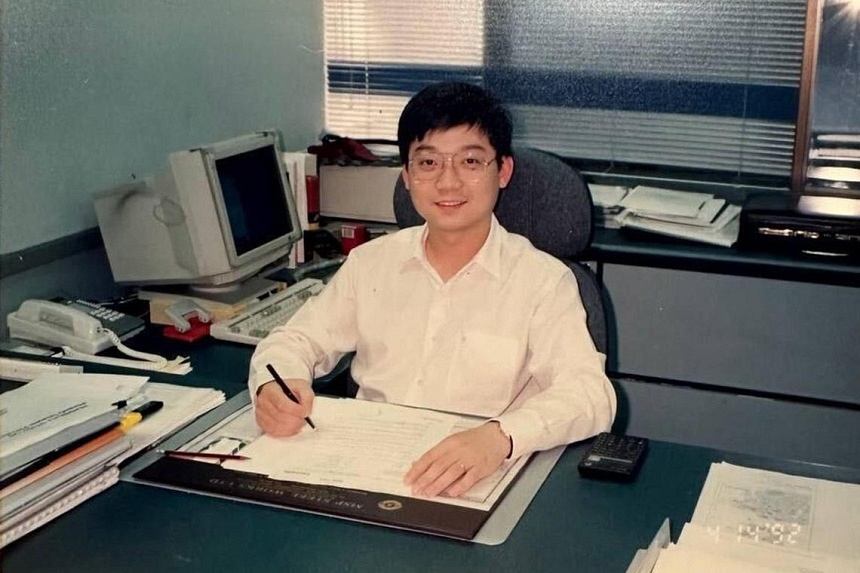
Rising through the ranks, he became chief executive and president of NatSteel in 2005.
The overcapacity of the global steel industry led to its decline, and in 2002, the president of NatSteel, Mr Ang Kong Hua, together with several senior managers, including Mr Gan, proposed a management buyout of NatSteel, with the backing of banks.
The idea behind this was to give top management a sense of mission and ownership of the business, Mr Gan recalls.
In the end, though, NatSteel went to a consortium in 2003.
The NatSteel years taught Mr Gan the value of teamwork and people sticking together during tough times.
After NatSteel was acquired by the consortium, the management team continued to run the company. “Almost all of us stayed on, and this team spirit in the senior management was very important. If everybody had their own agenda, it would have been very hard to stay put as a team.”
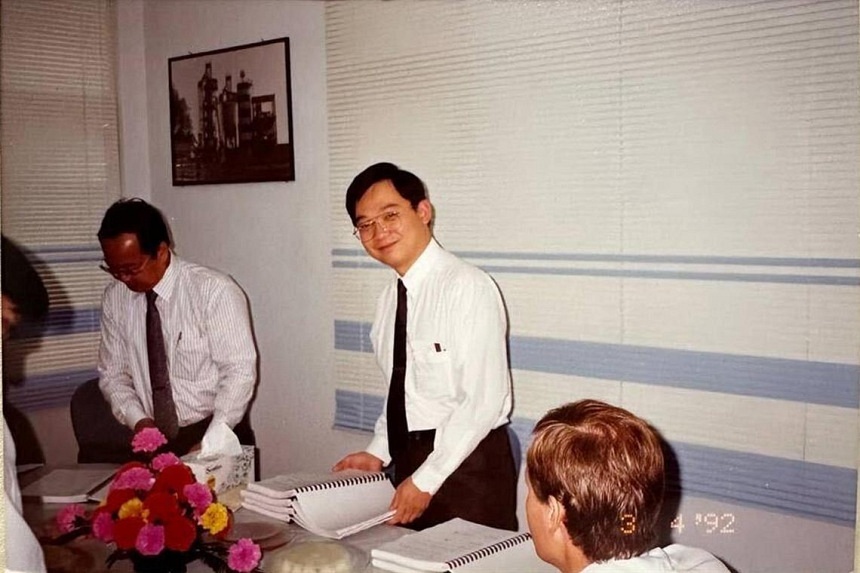
He believes that good team dynamics are about playing to each person’s strengths.
“Each of us has weaknesses, but we also have different strengths. Some people are very good in marketing, some in audit, and if we work as a team, we cover for each other, especially during a crisis. That was a very important lesson for me.”
I suppose this applies to the Cabinet, too, I say.
“Yes, yes,” he replies. “Whatever you do, teamwork is actually the core. If you can’t bring a team together, it’s very difficult. Then you always have to worry.”
The GE ahead
His road to politics began in the late 1990s when then PAP MP for Joo Chiat, Mr Chan Soo Sen, asked him to help out at the grassroots there. Mr Chan had been a senior schoolmate of Mr Gan’s at Catholic High School.
“I had no political ambition and never thought of going into politics,” Mr Gan says.
But the party asked him to contest the 2001 General Election. “I thought for a long while and talked to many people because it’s a different life altogether. Eventually, I said, ‘okay’.”
He was fielded in the Holland-Bukit Panjang GRC, which won in a walkover.
After four years as an MP, he was asked to join the Government. He was persuaded by then PM Lee Hsien Loong, who said he would help chart Singapore’s future.
He became Minister of State in the Manpower and Education ministries in 2005. “That was the closest I got to teaching,” he jokes.
But he was still ambivalent about a political career and reckoned that if he wasn’t deemed suitable as a political office-holder, he could return to the private sector.
“I was not even thinking of becoming a minister,” he says. “Once you are part and parcel of the team, there will be a career pathway, and you may or may not make it.”
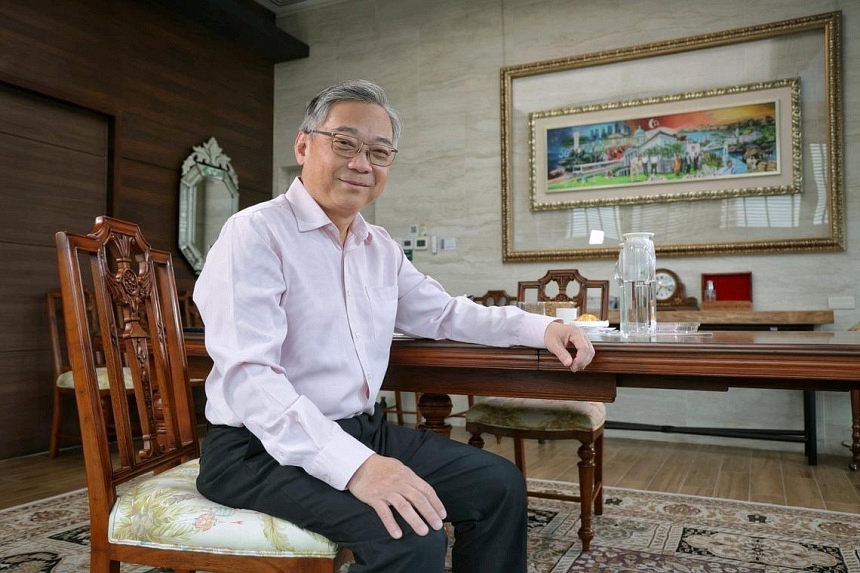
But he did well enough to become Acting Minister for Manpower in 2008, and full minister the following year.
One of his challenges was to deal with the fallout of the 2008 global financial crisis and the recession that followed. He led efforts to minimise mass retrenchments and have workers retrained.
He remembers how the Government, trade unions and employers worked together to roll out the Skills Programme for Upgrading and Resilience (Spur).
Under Spur, the Government subsidised up to 90 per cent of a worker’s training fees and paid the employer an allowance for the worker’s wages while he or she was in training. Mr Gan says that then National Trades Union Congress secretary-general Lim Swee Say described it best. “He said we used to cut jobs to save costs. But under Spur, we are cutting costs to save jobs.”
Spur, Mr Gan adds, was possible only because of teamwork among the tripartite partners.
In 2011, he moved to the Ministry of Health, where he spent a decade steering critical reforms, from expanding healthcare infrastructure to launching landmark initiatives such as CareShield Life, MediShield Life and the Pioneer and Merdeka Generation packages. He also chaired the Ministerial Committee on Ageing.
Healthcare reforms started with his predecessors, Mr Khaw Boon Wan and Mr Lim Hng Kiang, he points out. “I continued the work.”
He passed the health baton to Mr Ong Ye Kung in 2021, and notes how nearly one million people have enrolled in the preventive health programme, Healthier SG, since its launch in 2023. “It’s a great achievement.”
Much has already been said about how the Government handled Covid-19. He stresses his gratitude to the medical fraternity and civil servants for their handling of the pandemic.
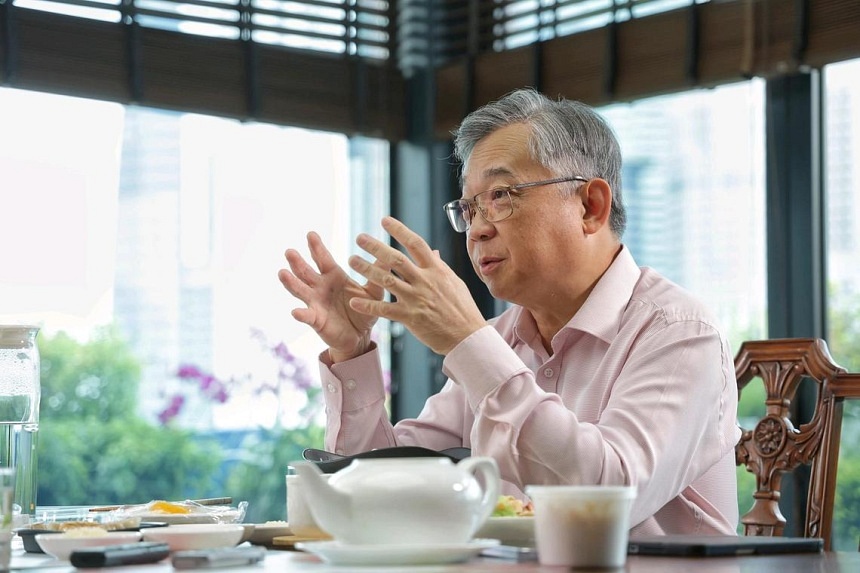
I broach the topic of the general election, which I observe must be held sooner rather than later.
He protests. “Sooner or later,” he corrects me.
What would be a good result for PM Wong?
“I wouldn’t project a number,” Mr Gan says. “How many votes we get, how many per cent share of the votes, will depend on many factors. It’s not just about Prime Minister Wong’s leadership.”
The Government’s policies and whether Singaporeans feel hopeful about the future all come into play as well.
“The key is really whether people support him,” he says. “The engagement is very important, more important than actual votes. When you engage the people, people understand who you are, and people can feel that they can share with you... their passions, ambitions and concerns.”
Attention will no doubt also be paid to Mr Gan’s Chua Chu Kang GRC ward, where he has been the anchor minister since 2011.
At the 2020 election, the PAP team in the GRC won 58.6 per cent of the valid votes, significantly lower than the 75.9 per cent in 2015. It received 61.2 per cent in the 2011 election.
He was surprised by the 2020 result but acknowledges there were concerns on the ground, which are being addressed. The 2015 General Election was also held in Singapore’s Jubilee Year and after the passing of founding prime minister Lee Kuan Yew. “It cannot be repeated,” Mr Gan says of the PAP’s good showing that year.
He rather enjoys the grassroots part of politics because “I always look at it as meeting friends” rather than as a job.
In his private life, Mr Gan is married to a private banker, whom he met at church. They have two daughters. The elder, who is married, is a lawyer, and the younger works in the public service. Mr Gan is also an elder at a Presbyterian church in Geylang.
As our lunch winds down, he reflects on his journey, saying: “There are pathways in life that sometimes lead you to places that you didn’t plan. You may not want it in the beginning, but it may turn out all right.”
He adds a touch wistfully that his passion is still teaching.
“I hope one day, after I retire, I can go back to teaching somehow, one way or the other.”
If he does, it wouldn’t surprise me if he became a popular teacher.
Join ST's WhatsApp Channel and get the latest news and must-reads.



No comments:
Post a Comment